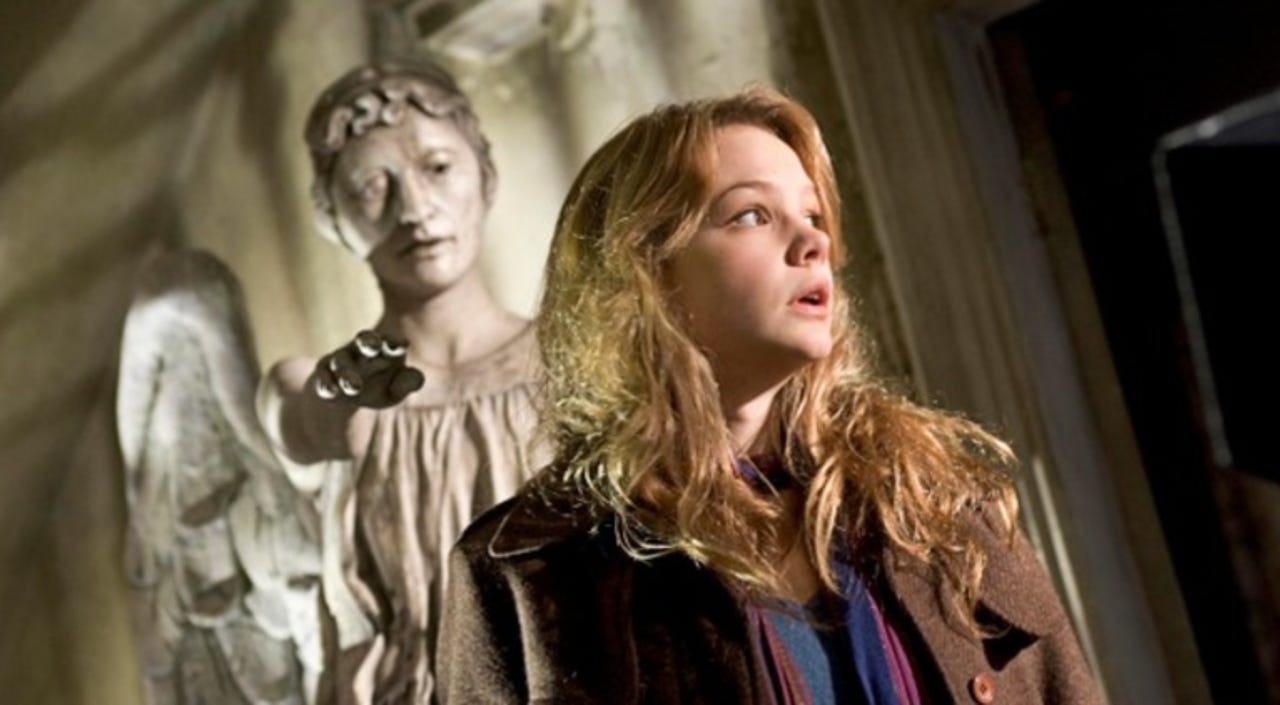Broadcast: June 2007
Watched: September 2021
“This is my timey-wimey detector. It goes ding when there’s stuff.” I sort of feel like this sums up to RTD/Moffat approach to the show. The mechanics don’t matter, it’s the characters that do, so a joke is better than some technobabble. Ditto “they’re creatures of the abstract, they live off potential energy”.
The idea that Blink is one of the best Who stories of all time means that you perversely sort of forget how good it is unless looking directly at it. But that’s nice because it means it can still surprise you. It is absolutely rammed with amazing conceits – the DVD easter eggs, pulling down the wallpaper to reveal the message, the angels themselves, which are now so familiar that it’s easy to forget how great they are, too, it’s like they always existed.
And it’s *weird*: it’s a horror story about time travel, written as a screwball comedy, and the Doctor is barely in it. Even more than Love & Monsters it’s about the Doctor as a presence and a force more than a person (it bookends Family of Blood nicely).
It’s very neatly structured. After the intro, you’ve got a first act with Kathy, a second with Billy, a third with Lawrence, who has been in the background of the other two and is the only one whose life Sally doesn’t accidentally destroy. (Bit under-discussed, that: by filling the Doctor role she ends up as destructive as him.) Over those three acts the Doctor gradually emerges, from a weird background presence, to a cameo, to an active role in the plot.
The ending, with the angels all looking at each other forever, is an amazing trick, although
a) attempting to hide in the cellar was extraordinarily stupid;
b) it’s not clear why or how the TARDIS takes off without Sally and Lawrence in it, except plot necessity;
c) the first builder who attempts to move one of those statues is fucked.
And then the final sequence, of sinister music over statues, which has no plot relevance and exists entirely to traumatise kids so that they remember this forever. It’s brilliant.
My only slight complaint is that Sally is an absence – she’s just standard issue Moffat Female Character 2 (”the spunky one”), and Mulligan doesn’t fill the gap. Which is weird as she’s great in other things. But she’s fine.
I’m not saying these years spoiled us, but that’s two candidates for the best story ever back to back. How often does that happen?
Other thoughts:
The one sided conversation bit, which seems really clever, might actually not be? Surely you just write the scene where it’s a conversation and then backfill clips earlier in the script?
“Wester Drumlins” is a great name. Yes, I know it’s real.
This is incredibly fairy tale. I can’t decide if that undermines the statements Piers Wagner would push Moffat to make when he takes over, or points towards them.
There is rain everywhere in this except in December 1920 when it’s blazing sunshine. I feel like this is meant to be symbolic (”I have until the rain stops”) but I can’t work out how or why.
Moffat did not speak to any women before writing the scene in which Sally explores a spooky mansion on her own at midnight.
“Bit ITV.” “I KNOW!” I love the way Moffat manages a drive-by on the great enemy, and makes it a character note at the same time.
Random thoughts on the characters. Kathy ends up in the past because she hides; she’s punished for her cowardice. Sally chickens out of telling Lawrence his sister is effectively dead. Lawrence, who is an idiot for most of this, is the only who realises what’s happened when they win.
Billy is very badly dubbed, in an attempt to match Louis Mahoney’s accent. Obiara is very young to be a DI, though Old Billy’s age suggests maybe he’s playing up. I’d written down “How does the Doctor know Billy will die?” but oh, it’s explained at the end.
Talking of the end, I like the way Sally can only relax when the the last beat of the plot clicks together (”It’s still in your future!”). Elements of both Library and Fireplace there. Three out of Moffat’s four RTD era stories are about time travel, and the fourth uses it as a plot element by making Jack a time agent.
The existence of a DVD shop – possibly two DVD shops, does something horrible happen to Banto that Sally and Lawrence take over? – really dates this.



